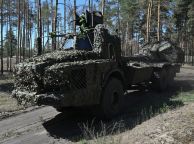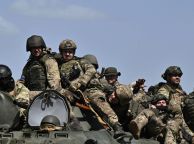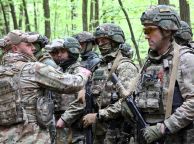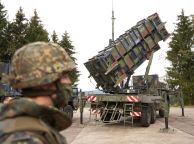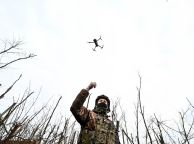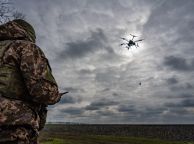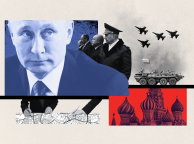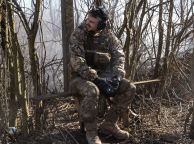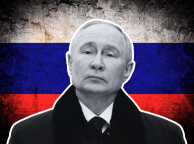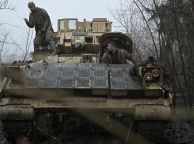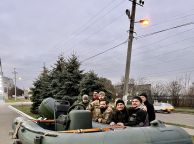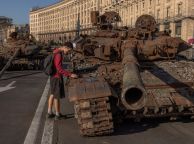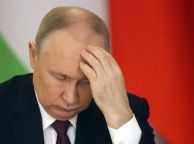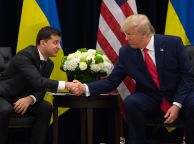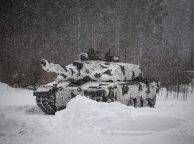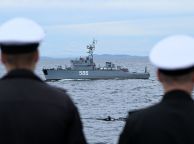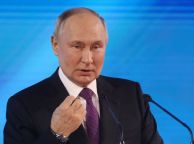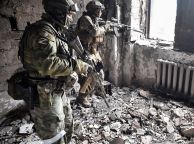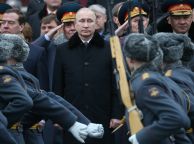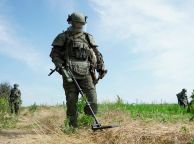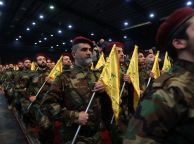By Brendan Cole
Vladimir Putin has faced setbacks during his full-scale invasion of Ukraine. Now, two years into the war, circumstances appear to be turning in his favor, and his grip on power shows no sign of waning.
Ukrainian resistance at the war's start saw Russian forces pushed back from Kyiv and, later in 2022, retreats from Kharkiv and Kherson delivered blows to Putin and bold headlines for Kyiv, as did strikes on Russian Black Sea targets, which continue.
But over the past few weeks, Putin has had some news go his way. U.S-led sanctions aimed at isolating Russia from the global financial system may have caused ructions but the IMF last month predicted GDP growth of 2.6 percent in 2024—more than double its previous forecast.
Also, Putin heads into an election on March 15 that he is assured of winning buoyed by the death of Russia's most prominent opposition politician, Alexey Navalny, Western wobbles on more aid for Kyiv, and the capture of Avdiivka, in the Donetsk oblast.
"Domestically, Vladimir Putin is stronger than before," Ralph Carter, political science professor at Texas Christian University, told Newsweek. "He's rallied public opinion behind his leadership, calling Western sanctions an attack that he's neutralized.
"He's also neutralized domestic opposition, with the deaths of Alexei Navalny, his most prominent critic, and Yevgeny Prigozhin, the leader of The Wagner Group. The message to Russians—if it can happen to them, it can happen to you."
A vehement critic of Putin's wartime conduct, Prigozhin seized military facilities in Rostov-on-Don and marched on Moscow with his Wagner Group of mercenaries. He died in a plane crash widely seen as punishment for his challenge to Putin's authority, although the Kremlin has denied any responsibility.
New Markets, Trump and Congress Deadlock
Putin is pivoting away from the West and in the teeth of sanctions which saw Europe decrease its reliance on Russian energy. Moscow has found some success in finding new markets for its valuable exports, in particular China and India.
"The position of Putin appears stronger than it was six months ago," John Hall, law professor at Chapman University, California, told Newsweek. "Attempts to isolate Russia economically have proven far less successful than hoped, primarily because of India's willingness to purchase Russian oil.
"The war in Ukraine is going better for Russia than it has for months, as Russia has secured pipelines of weaponry from North Korea, Iran and China, while Ukraine faces serious shortages of weaponry and manpower."
With no discernible end to the deadlock in U.S. Congress over further funding for Ukraine, Putin has also benefited from former president Donald Trump's rhetoric, embraced by part of the GOP, opposing more military support for Kyiv.
"Trump has used his influence to undermine any on-going support for Ukraine, a policy that benefits only Putin," added Hall.
NATO Solidarity Questioned
Trump's disparaging of NATO, which has included urging last month Russia to attack its members that do not meet a 2 percent minimum spending requirement, has also played into Putin's hands, said U.S.-Russian relations expert Ken Osgood, history professor at Colorado School of Mines.
"Cracking NATO solidarity has been a goal of every Russian leader since Joseph Stalin," he told Newsweek. If Trump were to take the White House and be unable to change the U.S. relationship with the alliance, or even if he loses the election, "Putin has already scored a significant gain by making an American withdrawal from NATO a serious (topic) of political conversation."
What About the Long Term?
Jennifer Kibbe, professor of government at Franklin & Marshall College, told Newsweek that Putin is "clearly in a stronger position in Ukraine than he has been for over a year having just taken over Avdiivka and with Ukraine struggling as its weapons supplies slow down."
"Unfortunately, at least in the short to medium term...his grip on power is more consolidated than ever and it's highly unlikely that it could unravel."
But the swiftness of the mutiny by Prigozhin last June showed just how quickly the situation in Putin's Russia can change.
"Yevgeny Prigozhin managed to take over a major military command center without firing a shot, and march with armed loyalists to within a couple hundred miles of Moscow—not the sort of state breakdown that could happen in a fully consolidated totalitarian regime," Stephen Hanson, professor of government at William & Mary University in Virginia, told Newsweek.
"It is important not to overstate the security of Vladimir Putin's long-term grip on power."
Beth Knobel, former Moscow bureau chief for CBS News, said that Russians are growing wary of the war, and the high losses could eventually hurt the president's standing.
"I actually think Putin is in a weaker position now than two years ago," the Fordham University professor told Newsweek. "Russians have lost a lot because of the war in Ukraine."
The arrests of those paying their respects publicly to Navalny were a sign of this, in her view. "Putin deeply fears the kind of popular revolution that we have seen in other nations."
Randall Stone, director of the Skalny Center for Polish and Central European Studies at the University of Rochester, said that Putin will take pains to avoid the street protests that swept leaders this century in post-Soviet states like Georgia and Kyrgyzstan as well as Ukraine.
"Putin is very insecure, and the rebellion of the Wagner forces made clear how tenuous his hold on power is. He does not dare to end the war in Ukraine without a substantial victory, but public distaste for the war limits his war effort," Stone said.
Konstantin Sonin, a Russian-born economist who works at the University of Chicago, said that the death of Navalny is a "huge win for Putin in the short-term," but that the Russian president has "totally cornered himself."
"I do not think that there is a way out what he is in. He cannot stop the war. He cannot stop repression," he told Newsweek. "It's not like that it can go infinitely, so I assume that this brings him closer to his end."
